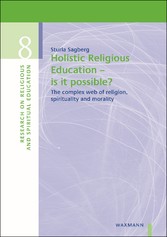Suchen und Finden
Service
Mehr zum Inhalt

Holistic Religious Education - is it possible? - The complex web of religion, spirituality and morality
Book Cover
1
Preface
5
Acknowledgements
7
Contents
9
Introduction
13
Holistic religious education or bits and pieces
13
The meaning of holism
16
The main question and the main problem
19
The child and the process of making meaning
21
The art of holistic religious education
23
Holistic education and the complex web of religion, spirituality and morality
24
I The child and the process of making meaning
25
1 Where it all starts: Children as spiritual subjects, and the meaning of time and space
25
Theoretical backdrop
25
‘Time and space for wonder’
28
A narrative approach to meaning
28
Kindergarten A: Ordinary time, infinite space and heaven
30
Kindergarten B: Empathy and rules of conduct
32
Kindergarten C: Time and space for wonder
35
Children’s meaning-making, spirituality and different educational environments: summary and outlook
37
2 The concept of ‘child’ and the question of identity formation
40
A new concept of the child?
40
The paradox of the new child paradigm
42
The new child paradigm and religious education
43
The power of a traditional Christian view of the child
44
The child concept has changed in times of crisis
45
The ‘identity’ concept
47
Identity and personal memory
48
The child, the church and the family: some trends and issues in a Nordic perspective
51
Summary and outlook
52
3 The child in theology – and as theologian?
54
A family of related concepts
55
The Child Theology Movement
56
The Kindertheologie network
56
Child theology in Norway
59
Child theology and a ‘broad and complex view of children’
63
Summary and discussion
64
4 Children’s faith – a matter of morality?
71
Conceptual and methodological challenges concerning children’s faith
71
Faith and ‘childhood learning’
74
Children’s faith is existential trust
75
Faith and morality interrelated or mixed
77
5 Children’s meaning-making as spirituality
81
A rumour of angels
81
The paradoxical interest in the spiritual in late modern society
82
Two roots in research on spirituality
83
Religious and/or spiritual development?
83
The point mode and the line mode
84
Spirituality is not a matter of either religious or secular worldviews, but of being connected or alienated
85
Which spirituality are we looking for?
85
Recent research and new trajectories
88
Hermeneutics of spiritual education for young children – an attempt
91
Back to the angels – and down to earth
98
II The art of holistic religious education
101
6 Education as a spiritual process, and the meaning of religious nurture
101
The dynamics of spirituality in education
102
How can religion and religious education relate to education in general?
106
The meaning of education
106
Religion in spiritual education
108
A Norwegian example
109
Religion in spiritual education and political ethics
113
Conclusion and outlook
115
7 Religious education and the pedagogy of wonder
117
Three kinds of wonder
117
The beginning of knowledge of all kinds
118
Wonder increased or replaced by knowledge: Two strands of understanding
119
Wonder in the New Testament
121
Platonic and Aristotelian influences on Christian theology
123
From religious wonder to aesthetic wonder
124
Wonder in religious education – philosophical, religious or both?
126
What is the significance of wonder in religious education?
130
The object of wonder is particular events, not only universal issues
131
The subjective aspect of wonder involves open-ended philosophy
132
A language of wonder has ethical aspects
132
Wonder and the question of truth in religious plurality
133
Summary
134
8 Religious education and religion as culture
136
A functional or substantial approach to religion and culture
137
Religion understood in terms of cultural relativism or constructivism
138
Religious culture and the issue of cultural or religious identity
141
The power of religious culture and possible consequences for religious education
143
Summary and outlook
145
9 A holistic approach to the art of religious education
147
Eight principles of holistic education
147
Religious education in the town square, in the narthex or on a pilgrimage?
151
Making meaning of the complexity of religion, spirituality and morality
154
References
156
Index
169
Alle Preise verstehen sich inklusive der gesetzlichen MwSt.









